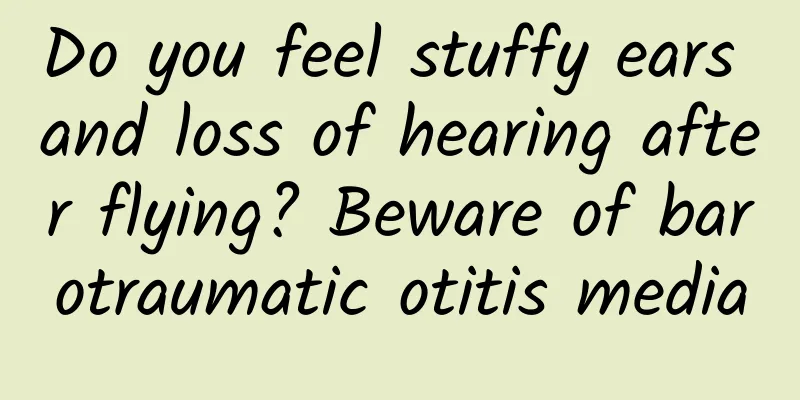Do you feel stuffy ears and loss of hearing after flying? Beware of barotraumatic otitis media

|
After the end of the plum rain season, the high temperature comes. This year's summer vacation is particularly hot, and as hot as the weather is everyone's enthusiasm for traveling. I wonder if you have ever experienced stuffy ears when flying on an airplane. This is the topic we are going to talk about today - barotraumatic otitis media! Imagine that during the journey, when you are free and looking at the scenery outside the window, as the plane slowly climbs, you suddenly feel that your ears are blocked by something, stuffy, and even a little painful. At this time, your family members next to you are talking to you, but you can't hear clearly. After getting off the plane, the stuffy feeling in your ears seems to be better, but it is still a little uncomfortable, and the sound always feels weird. In the next few days, although there are beautiful scenery and delicious food, the whole world seems to be covered, and there is an indescribable discomfort. Everything stems from that rapid takeoff. The "uninvited guest" that caused your ears to feel uncomfortable is barotraumatic otitis media. 1. What is barotraumatic otitis media? Barotraumatic otitis media, as the name implies, is an inflammation of the middle ear caused by changes in air pressure. When the external air pressure changes dramatically, such as when flying, diving, or undergoing hyperbaric oxygen chamber treatment, the Eustachian tube leading to the middle ear from the nasopharynx in the human body cannot adjust the pressure in the middle ear cavity in time, resulting in an imbalance in the pressure inside and outside the middle ear cavity, which in turn causes damage and inflammation of the middle ear mucosa. In this case, the patient may experience ear pain, stuffy ears, hearing loss, tinnitus, and even secondary discomfort such as perforated eardrums and pus discharge from the ears. 2. Eustachian tube, the "pressure regulator" of middle ear pressure When introducing the definition just now, I mentioned the "Eustachian tube". What part is this? In fact, to understand barotraumatic otitis media, we have to mention the key role of the "Eustachian tube". The Eustachian tube is a mysterious channel connecting the middle ear cavity and the nasopharynx. It can control the opening as needed, thereby regulating the amount of air entering the middle ear cavity. In most cases, the Eustachian tube is closed, but it will open instantly when opening the mouth, swallowing, yawning, etc., so that the middle ear cavity and the external air pressure are balanced. The Eustachian tube is usually unknown, but did you know that the Eustachian tube occasionally "strikes". When the external air pressure changes too quickly, such as when the plane rises or descends rapidly, if the Eustachian tube cannot open and adjust in time, the middle ear cavity will fall into a dilemma of relative positive or negative pressure, thereby causing aseptic damage to the middle ear mucosa, and barotraumatic otitis media will come quietly. Once otitis media is formed, the regulatory function of the Eustachian tube will also be affected, and the Eustachian tube will "strike". After the "strike", otitis media will be even worse. 3. Prevention and treatment: When flying in the blue sky, don’t forget to take gentle care of your ears. A relaxing vacation is not easy, don't let this little trouble ruin your good time, is there any way we can prevent or alleviate it? Of course there is! 1. Keep the Eustachian tube open: During takeoff and landing, swallow more, chew gum or pinch your nose to blow air, which can help open the Eustachian tube and regulate the pressure inside and outside the middle ear cavity. It is important to note that the key to chewing gum is to swallow saliva, because the Eustachian tube is only open when swallowing, and chewing without swallowing will not have any effect. 2. Avoid sleeping during takeoff and landing: This does not mean that you cannot sleep. Try not to sleep during takeoff and landing to avoid missing the best time for your middle ear to adjust the air pressure. 3. Treatment of other related diseases: If you have chronic rhinitis, sinusitis or other diseases that may affect the function of the Eustachian tube, it is best to actively treat them before traveling. Children with enlarged adenoids should also pay special attention. Adenoids block the Eustachian tube, which can easily induce barotrauma media when flying, and it is easy to progress to chronic exudative otitis media. Many times, even if children feel uncomfortable in their ears, they will not express it clearly, and often miss the best time for treatment. 4. Of course, if you are unfortunately infected, don’t panic and seek medical attention in time. Generally, you can recover after appropriate drug treatment. Now you should be familiar with this disease, right? Next time you take a flight, follow these steps and you can easily deal with it. Don't let barotraumatic otitis media become a problem on your pleasant journey. |
>>: Myopia surgery examination report, teach you how to understand 9 important data!
Recommend
Will uterine prolapse affect my sex life?
There are always some women in middle and old age...
Is it normal to bleed every time I ovulate? Comprehensive judgment is also needed
Many women experience bleeding during ovulation. ...
Can I eat black plums during menstruation?
Women's bodies are quite special during menst...
What is the most effective way to relieve menstrual cramps?
Almost every woman has experienced menstrual stom...
What materials are used for skirting boards? What materials are used for skirting boards?
We all know that decorating a house is a complica...
Is dysmenorrhea a gynecological disease?
The most common symptom for women during menstrua...
Can I have sex at 36 weeks of pregnancy?
It is not recommended to have sexual intercourse ...
Pictures of severe cervical erosion
Patients with cervical erosion have a higher inci...
Is it okay to eat sweets while pregnant?
During pregnancy, women will have a special prefe...
Introducing the symptoms of half a month of pregnancy
Let me introduce to you the symptoms of pregnancy...
What to eat during menstruation to replenish qi and blood
During the menstrual period, immunity decreases a...
How long does it take for the belly to shrink after induced abortion?
During pregnancy, a woman's abdomen will beco...
What medicine should I take for urinary tract infection during pregnancy
Women are very prone to illness during pregnancy,...
Is it okay for a three-month pregnant woman to take a bath with salt water?
Many women don't want to move after they beco...
What is the meaning of the Red Deer CP? How is the cultivation system idol trained?
Nowadays, fan fiction CPs are very popular, and M...









